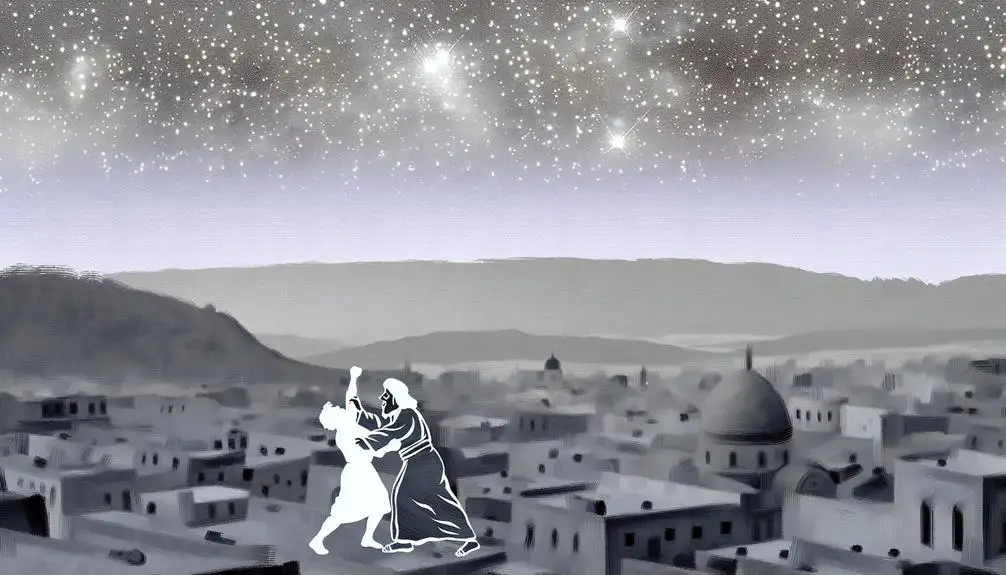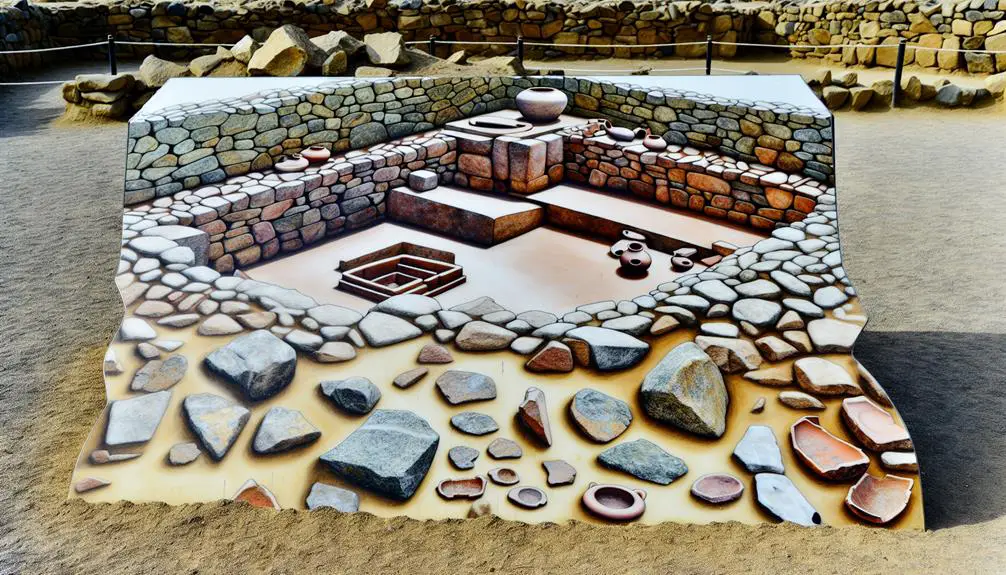Discover how Penuel in the Bible became a battleground for transformation, leaving Jacob—and history—forever changed.

Penuel in the Bible
Imagine standing alone under a starlit sky, wrestling until dawn's first light; this is the essence of the biblical story of Penuel. You find yourself in a place where Jacob, one of the patriarchs, encountered God face to face and emerged transformed, no longer Jacob but Israel.
This moment at Penuel wasn't just a personal turning point for him but a pivotal event in the spiritual narrative of a nation. As you explore the layers of meaning behind Penuel, you'll uncover how this ancient site echoes the struggles and revelations that continue to shape faith and identity today.
Why did this place leave such an indelible mark on Jacob and, by extension, on the history of a people?
Key Takeaways
- Penuel signifies a profound spiritual encounter, symbolizing Jacob's transformation and identity redefinition.
- The site holds historical and theological significance, reflecting its role in biblical narratives and spiritual metamorphosis.
- Archaeological discoveries at Penuel offer insights into ancient civilizations and the theological implications of divine encounters.
- Jacob's name change to Israel at Penuel marks a foundational narrative for understanding faith, identity, and divine mission in biblical theology.
The Meaning of Penuel

Delving into the etymology of 'Penuel,' it's revealed that this biblical name signifies 'face of God,' a profound concept that carries significant theological implications. Through analysis, you'll uncover that Penuel isn't just a name; it encapsulates a deep spiritual encounter, marking it as a place of divine revelation and transformation. This notion of facing God directly, implied by its name, underscores the location's significance in biblical narratives, serving as a physical and metaphorical site where humanity encounters the divine.
In biblical occurrences, Penuel is more than a mere backdrop; it's a pivotal setting for events that highlight the intersection of human and divine realms. The designation of Penuel as a location signifies a threshold, a point of transition where individuals are confronted with the presence of God, leading to profound personal and communal shifts. This underscores the intricate relationship between place and spiritual experience in the biblical text, where geography and theology intertwine, revealing deeper layers of meaning within the narrative. Thus, Penuel stands as a testament to the transformative power of divine encounters, etched into the fabric of biblical history.
Jacob's Nighttime Struggle
Reflecting on the profound spiritual implications of Penuel as the 'face of God,' we now explore Jacob's nighttime struggle there, a pivotal moment that epitomizes the intersection of human vulnerability and divine power. This encounter, shrouded in mystery and rich in symbolic meaning, underscores the transformative power of divine-human interaction.
- Mysterious Opponent: Initially, the identity of Jacob's opponent is ambiguous, suggesting an encounter that transcends the physical realm and delves into spiritual dimensions.
- Injury Implications: The injury Jacob sustains, a dislocated hip, serves not just as a physical reminder but also symbolizes the lasting impact of divine encounters, altering one's journey both literally and metaphorically.
- Esau's Anticipation: This event unfolds in the shadow of Jacob's impending reunion with Esau, infusing his struggle with layers of fear, hope, and the quest for reconciliation.
- Divine Encounter: The struggle at Penuel is emblematic of the wrestles each person faces when confronted with the divine, pushing Jacob to the brink of his limits and beyond.
In grappling with an enigmatic figure till dawn, Jacob's experience at Penuel becomes a profound narrative of struggle, transformation, and the pursuit of divine blessing, highlighting the intricate dance between human effort and divine grace.
The Transformation of Jacob

You'll find that Jacob's nocturnal encounter, where he wrestles until dawn, marks a pivotal moment in his spiritual journey. This struggle not only results in his name being changed to Israel, symbolizing his transformation but also unveils profound spiritual significances.
It reflects his perseverance and the divine acknowledgment of his growth, setting a foundational narrative for understanding the dynamics of faith and identity in biblical contexts.
Jacob Wrestles at Night
In the biblical narrative, Jacob's nocturnal wrestling match at Penuel marks a pivotal moment of transformation and identity redefinition. This moonlit encounter isn't just a physical struggle but a spiritual confrontation, leaving Jacob with not only an injury but profound implications for his future.
- Moonlit Encounter: The setting under the moonlight adds a mystical dimension, emphasizing the surreal and transcendent nature of the event.
- Injury Implications: Jacob's resulting limp serves as a permanent reminder of his vulnerability and human limitations.
- Spiritual Confrontation: This event is deeply symbolic, representing Jacob's struggle with divine forces beyond his control.
- Transformation and Identity: Beyond the physical altercation, this episode is crucial for Jacob's spiritual growth and understanding of his place within a broader sacred narrative.
Name Changed to Israel
Emerging from his nocturnal wrestling match at Penuel, Jacob undergoes a significant transformation as his name is changed to Israel, symbolizing a profound shift in his identity and divine purpose. This event marks a pivotal moment in his life, reflecting not just a change of name but an entire reorientation of his character and destiny.
Naming rituals in ancient cultures, including those depicted in biblical narratives, often signify critical junctures of personal evolution or identity crisis. For Jacob, this renaming signifies his overcoming of past deceits and struggles, embodying a new role as a patriarch with a direct covenant with God.
The transformation from Jacob to Israel isn't merely nominal; it encapsulates a spiritual and moral rebirth, highlighting the intricate link between personal identity and divine mission in biblical theology.
Spiritual Significance Unveiled
Jacob's transformation into Israel reveals a profound spiritual awakening, marking his transition from a life marked by deceit to one of divine purpose and integrity. This pivotal moment, spurred by an angel encounter, signifies not just a name change but a complete overhaul of his identity and destiny.
- Angel Encounter: A tangible manifestation of divine intervention, challenging Jacob physically and spiritually.
- Spiritual Awakening: Marks a critical turning point, leading to self-realization and a deeper connection with the divine.
- Divine Purpose: Jacob's journey becomes aligned with a higher calling, steering him towards actions that fulfill a larger, divinely ordained plan.
- Integrity Restoration: The transformation symbolizes a cleansing of past deceits, setting the stage for a life led with honesty and moral uprightness.
God's Presence at Penuel

At Penuel, God's presence manifested uniquely, marking a pivotal episode in biblical narrative where divine and human realms intersected. This divine encounter wasn't merely an abstract spiritual experience; it was deeply personal and transformative, underscoring the profound location significance. Penuel served as a tangible touchpoint between the earthly and the divine, a place where the physical and spiritual worlds collided with life-altering consequences.
Analyzing this encounter, it's clear that Penuel wasn't chosen at random. Its very geography spoke to a liminal space, one fitting for such a groundbreaking divine-human interaction. Here, the wrestling match between Jacob and the angel, often interpreted as a divine figure, wasn't just physical but deeply symbolic. It represented the struggle of faith, the quest for identity, and the pursuit of blessing from the divine.
This encounter at Penuel thus becomes a critical lens through which to view the broader narrative of divine human engagement in the biblical text. It highlights the intensity and intimacy of God's interactions with humanity, setting a precedent for understanding God's presence as both imminent and transcendent. Penuel, therefore, occupies a unique place in the sacred geography of the Bible, symbolizing a site of transformation and revelation.
Penuel in Israel's History
Throughout Israel's tumultuous history, Penuel holds a significant yet often overlooked role, serving as both a strategic location and a symbolic reminder of divine-human encounters. Its geographical location made it pivotal in ancient warfare and trade, situating it at the heart of numerous historical narratives.
- Crossroads of Civilizations: Penuel's placement at the junction of major ancient trade routes amplified its importance, making it a focal point for cultural exchanges and military campaigns.
- Scene of Biblical Encounters: It's not just a site of military significance but also a place where pivotal biblical events unfolded, underlining its dual importance in Israel's spiritual and temporal domains.
- Strategic Military Value: The battle significance of Penuel is underscored in the narratives of Judges and Kings, where its control was essential for dominating the surrounding territories.
- Symbol of Divine Providence: Its historical and geographical significance is further enriched by the events that symbolize divine intervention and guidance, resonating deeply with both historical and religious narratives.
Penuel's story is a testament to its enduring legacy in Israel's history, embodying both the struggles and the divine encounters that have shaped the nation.
Architectural Remains and Findings

You'll find that the task of uncovering Penuel's architectural remains presents unique excavation challenges, primarily due to the site's historical significance and geological complexities.
Notable discoveries, however, such as remnants of ancient fortifications and structures, offer invaluable insights into the city's architectural evolution and its role in biblical narratives.
These findings not only enrich our understanding of Penuel's past but also underscore the importance of meticulous archaeological methods in reconstructing historical landscapes.
Excavation Challenges
Uncovering the architectural remains and findings at Penuel presents a complex challenge, demanding meticulous analysis and interpretation. You'll encounter various hurdles, including securing funding sources and navigating the adverse climate impacts that can erode or conceal significant artifacts.
- Securing Funding Sources: Identifying and accessing financial resources for excavation and preservation.
- Climate Impacts: Dealing with weathering, erosion, and other environmental factors that threaten the integrity of archaeological layers.
- Technical Limitations: Overcoming the constraints of current archaeological technology to ensure accurate data collection.
- Cultural Sensitivities: Navigating the ethical considerations and respecting the cultural heritage of the site.
These aspects require a careful, scholarly approach, blending the excitement of discovery with the responsibility of historical preservation.
Notable Discoveries
Delving into the archaeological site at Penuel has led to the unearthing of remarkable architectural remains and findings, shedding light on ancient civilizations and their way of life.
Situated strategically, Penuel's location at the crossroads of ancient trade routes has made it a focal point for archaeological exploration. Experts have employed cutting-edge archaeological methods, including remote sensing and stratigraphy, to meticulously excavate and analyze the site.
These techniques have revealed complex structures, indicative of a well-organized society with advanced architectural capabilities. Among the discoveries, remnants of fortifications suggest Penuel was of significant military importance, while domestic artifacts provide insights into the daily lives of its inhabitants.
This combination of discoveries offers a nuanced understanding of Penuel's historical and cultural significance.
Penuel's Theological Significance
Penuel's theological significance lies in its symbolic representation of divine encounter and transformation in the biblical narrative. This location isn't just a geographical spot on ancient maps; it's a landmark of profound spiritual metamorphosis. The events that unfolded at Penuel have left an indelible mark on the fabric of faith narratives, serving as a touchstone for understanding how divine encounters can reshape one's destiny.
- Location symbolism: Penuel serves as a vivid reminder that physical places can embody deep spiritual truths and milestones in one's journey of faith.
- Divine encounters: The encounter between Jacob and the divine at Penuel is a pivotal moment, highlighting how personal struggles can lead to divine revelations and blessings.
- Transformation: Penuel symbolizes the transformative power of wrestling with God, where one emerges changed, bearing both blessings and scars.
- Legacy of faith: The story of Penuel enriches the tapestry of biblical history, offering insights into how places become sacred through the events that transpire within them.
Modern Interpretations and Insights

In modern theological discourse, scholars and believers alike explore how Penuel's narrative continues to shape contemporary understandings of faith, struggle, and transformation. This story, found within the ancient texts, resonates today, offering deep insights into the human condition and our relationship with the divine.
Aspect |
Insight |
|---|---|
Cultural Impact |
Penuel's encounter illustrates a pivotal moment where personal struggle intersects with divine purpose, echoing through cultures as a symbol of perseverance and faith. |
Psychological Analysis |
The narrative offers a rich ground for psychological analysis, revealing how personal transformation can emerge from moments of profound crisis and confrontation. |
This analysis not only unpacks the layers within the story itself but also how it influences our modern spiritual and psychological landscapes. You're invited to see in Penuel's encounter not just an ancient event, but a mirror reflecting our own struggles and transformations. The cultural impact of this story extends beyond its religious origins, infiltrating art, literature, and common discourse, demonstrating its enduring relevance. Meanwhile, a psychological analysis of Penuel's experience provides valuable insights into the nature of human resilience, showing how individuals can emerge stronger from their trials. This dual approach enriches our understanding of the narrative, offering you a multifaceted perspective on its significance both in antiquity and today.
Frequently Asked Questions
How Has the Interpretation of the Events at Penuel Influenced Jewish and Christian Liturgy and Rituals?
You're exploring how interpretations have impacted Jewish and Christian practices. The symbolism of Penuel, where transformation and divine encounters are central, has deeply influenced liturgical adaptations. These interpretations have woven into rituals and prayers, emphasizing themes of struggle, blessing, and spiritual awakening.
Your focus on how these narratives shape liturgical expressions highlights the profound connection between ancient stories and contemporary faith practices, illustrating a dynamic interplay of tradition and interpretation.
Are There Any Significant Artistic Representations of Jacob's Encounter at Penuel in Historical or Contemporary Art?
You're exploring whether there are notable artistic depictions related to a significant event, focusing on sculpture analysis and visual symbolism.
In your search, you'll find that artists throughout history have indeed tackled this theme, embedding deep visual symbolism in their works. These pieces often reflect not only the moment's drama but also its profound implications, analyzed through the lens of both historical and contemporary art, offering a rich field for scholarly interpretation.
How Do Different Jewish and Christian Denominations View the Impact of Jacob's Experience at Penuel on Their Faith Practices?
In your exploration of faith practices among Jewish and Christian denominations, you'll find that Jacob's experience, marked by divine wrestling and a name change, profoundly influences beliefs. Jewish traditions often interpret this moment as symbolic of Israel's struggles and perseverance, while Christian perspectives might emphasize transformation and divine encounters.
Both view the event as pivotal, shaping prayer, identity, and understanding of struggle within their respective faiths, demonstrating its lasting impact across denominations.
Can the Concept of Transformation at Penuel Be Linked to Any Psychological Theories or Principles in Modern Psychology?
Certainly!
The idea of transformation can indeed be aligned with modern psychology, particularly through concepts like personal growth and psychological resilience.
You'll find that scholars often reference stages of change, where individuals undergo significant shifts in perspective or behavior, mirroring transformative experiences.
Psychological resilience, the ability to bounce back from adversity, is another principle that can be connected to this concept, showcasing how challenges can lead to profound personal development and strength.
Has the Site of Penuel Been Involved in Any Significant Geopolitical or Cultural Disputes in Recent History?
You're exploring how past landscapes shape today's conflicts, and Penuel's site is no exception. Interestingly, archaeological evidence hasn't prominently featured Penuel in recent geopolitical or cultural disputes.
Modern tourism, aiming to connect with biblical history, often overlooks this area, perhaps due to its ambiguous historical footprint. This lack of attention might actually preserve its integrity, allowing scholars to analyze its significance without contemporary biases overshadowing its ancient narrative.
Conclusion
In sum, Penuel personifies a pivotal point in biblical narrative, portraying profound transformation through tribulation. This sacred site symbolizes spiritual struggle and subsequent sanctification, serving as a seminal space where divinity and humanity intersect intimately.
Architectural artifacts anchor its ancient aura, while theological themes thread through its timeless tales. Penuel's profound presence in scriptural stories and scholarly studies signals a significant, symbolic stronghold, showcasing the soul's journey towards divine destiny through trials and triumphs.



Sign up